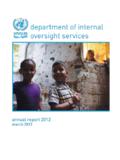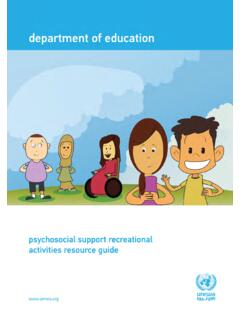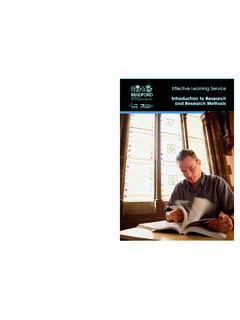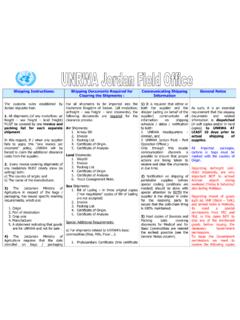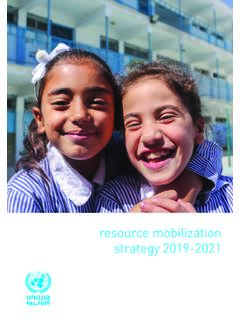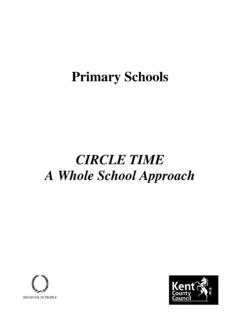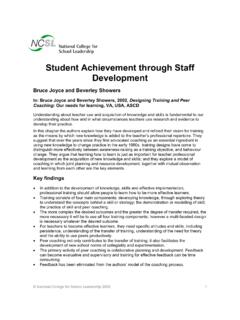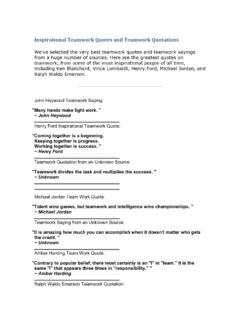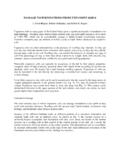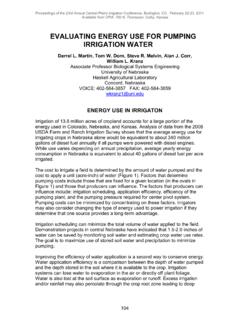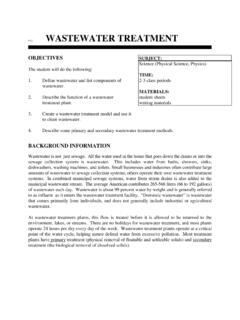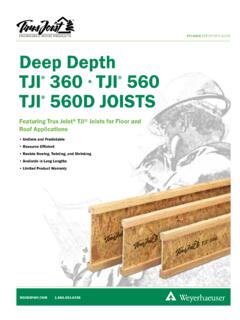Transcription of A6 Water Project Proposal FINAL version 24082011 - UNRWA
1 1 of 19 Project Proposal GENERAL INFORMATION Name of Organisation/Country of registration/ Registration number/ Charter organization to be attached: United Nations Relief and Work Agency ( UNRWA ) Title of the Project : Remediation and Upgrading of Camp Water Supply Networks in Seven Palestine Refugee Camps in Lebanon Area of intervention: Seven Palestine refugee camps in Lebanon Start and end dates of the Project (work plan in Annex): 18 months upon receiving the fund. Overall Project cost and requested funds: US$ ,216 Contact details (agency, key persons): Paz Fernandez Department of External Relations and Communication in Jerusalem (+ 97254 2168 507) 1. Situation General Water is essential for sustaining life and access to drinking Water is a fundamental need and a human right, vital for health and well-being.
2 The health and economic benefits of improved Water supplies to households and individuals (especially women, children and older people) are well documented, particularly if the target population is characterised by high levels of poverty, social exclusion and a lack of civil rights . Within the Palestine refugee camps in Lebanon, thousands of families continue to live in chronic and dire social housing conditions, in rundown and hazardous shelters and with decaying infrastructure. This includes a lack of adequate drinking Water , leaking sewerage pipes and deteriorating and congested roads and alleyways. Considering that Palestine refugees in Lebanon do not have the right to own property, it is crucial that they are provided with a safe, dignified and habitable environment in the camps in which they reside.
3 One of the most acute needs of the Palestine refugee community in Lebanon is access to potable Water within the camps. Although several functioning Water sources exist in each refugee camp, the quantity of Water provided is insufficient to meet the daily domestic requirements of the refugees. Additionally, in some of the camps the Water is unsuitable for drinking due to high salinity rates as reflected in the levels of Total Dissolved Solids (TDS) that fall far beyond World Health Organisation (WHO) standards. As a result, people are forced to buy Water for drinking and domestic use from small Water treatment plants located in and around the camps or from privately owned stores. The quality of this Water is not guaranteed.
4 This imposes an additional financial burden on refugees which many cannot always afford. With this intervention, UNRWA proposes to assist Palestine refugee community residing in seven camps in Lebanon (Shatila, Burj el-Barajneh, Mar Elias, Dbayeh, Beddawi, Mieh Mieh and Wavel camps). In three of the camps located in the Central Lebanon area (Shatila, Burj el-Barajneh and Mar Elias camps), the following measures are proposed: 1) Planning and implementation of works to improve Water production at source; 2 of 19 2) Planning and implementation of Water treatment systems subject to undertaking feasibility studies as required; and 3) Training for local community representatives in the operation and maintenance of the upgraded Water plants. In relation to Dbayeh Camp (also in Central Lebanon area), Beddawi Camp (located in the North of Lebanon), the proposed interventions consist of improving the Water network connections and increasing Water production at source.
5 For Mieh Mieh Camp (located at the South of Lebanon) and Wavel Camp (located in the Beqaa Valley), the proposed interventions consist of upgrading and enhancing the electricity supply (relating to the national supply from Electricite du Liban and backup generators). The goal of the Project is to ensure a long and healthy life by preventing and controlling diseases through the provision of access to safe drinking Water . Specific (concerning the Project ) Palestine refugees in Lebanon continue to endure difficult and deplorable living conditions, arising principally from their widespread social exclusion and lack of civil rights. As a result, the Palestinian population experiences high levels of unemployment, chronic ill-health and associated social problems.
6 In the absence of achieving a comprehensive resolution to their long-standing plight, the overall situation of Palestine refugees shows no sign of improvement in the foreseeable future. According to the recent socio economic survey undertaken in 2010 by the American University of Beirut and commissioned by UNRWA , more than two-thirds of Palestinians in Lebanon are poor (live on less than $6 per day) while of Palestine refugees are extremely poor (living on less than $ per day). In addition, the survey revealed that 56% of Palestine refugees are jobless, 31% of Palestinians are estimated to have chronic illnesses, and 95% of the refugee population is without health or social insurance. In accordance with many other international research studies, the AUB / UNRWA report shows the close correlation between a poorly built environment and endemic health burden.
7 In this context, contaminated Water supplies contribute to the dissemination of gastrointestinal diseases among the population, which disproportionately affects young children and people with deficient immune systems. However, the provision of adequate Water supply services in terms of quality and quantity is not so much a technical issue, but a financial one. In recent years, UNRWA has initiated a range of infrastructural improvements including the upgrading of Water supply systems. As part of this process, this Proposal is making the case for priority Water intervention projects to be carried out in five of the worst affected Palestine refugee camps. The three proposed interventions in the Central Lebanon Area form part of the Beirut Camps Potable Water Production Global Project which will increase access to an adequate supply of potable Water for the population of the three camps concerned.
8 In the three camps concerned (Shatila, Burj el-Barajneh and Mar Elias), the situation regarding access to potable Water is similar. The three camps have been partially or totally cut off from the Beirut Water supply network since the time of the civil war (1975 1990). Temporary measures were undertaken by UNRWA at the time to supply non-potable Water though the drilling of shallow boreholes, systems that are still in place today. 3 of 19 The current situation with regard to these camps remains very sensitive. Notwithstanding the fact that significant efforts have been made to improve the Water supply networks, the camp residents spend a large portion of their already meagre budget to buy potable and domestic Water to meet their needs. Further investment is therefore required to ensure an adequate supply of potable Water and reduce both the economic and health burden of the affected population.
9 Shatila camp: Located in southern Beirut, Shatila camp was established in 1949. For the 13,000 Palestine refugees currently residing in the camp, Water is supplied from two local Water wells that are managed by the camp s Popular Committee (the representative body for all camp inhabitants and the official interlocutor for UNRWA ). The Water from both wells is both undrinkable and unsuitable for domestic use. Shatila camp residents purchase potable and domestic Water for their daily needs from local Water providers located inside and outside of the camp. The camp suffers from a chronic shortage of Water (the deficit is estimated at 75% of the camp s needs). A hydro-geological study conducted in November 2010 in Shatila and Burj el-Barajneh camps financed by SDC confirmed that there is no viable source of fresh Water in both camps.
10 The only option is therefore to increase the supply of brackish Water from the unconfined aquifer through the use of additional shallow boreholes and to treat the produced Water with pre-filtration and reverse osmosis systems. Burj el-Barajneh camp: The camp was established in 1949 and is situated in the southern suburbs of Beirut. As of June 2011, 17,072 Palestine refugees are registered as residing in the camp and it is estimated that the camp Water supply needs to be able to cater for 28,000 persons, taking into consideration non-registered persons living in the camps and adjacent areas. There are more than 10 local wells managed by the Popular Committees which provide around 95% of the residents with non-potable Water . The majority of persons depending on Water produced from the camp boreholes are forced to find their own source of potable and domestic Water .
